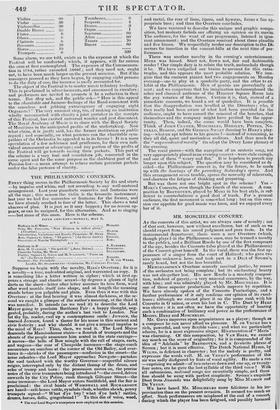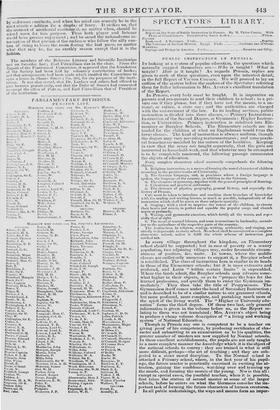MR. MOSCHELES CONCERT.
AT the concerts of this artist, we are always sure of novelty; not of that sort, however, new without excellence, but of such as we should expect from his sound judgment and pure taste. In the instrumental department, there were a new Overture (which, though played in the Philharmo&c once, may be termed a novelty to the public), and a Brilliant Rondo by one of the first composers of the age, besides the Concerto (also played at the Philharmonic) of the Concert-giver himself. In the vocal, there was the first ap- pearance of a singer from the court of Holland; who gave two airs quite unknown here, and took part in a Duat of SPOHR'S, rarely heard, but not the less beautiful. MENDELssoHN's Overture scarcely received justice, by reason of the orchestra not being complete ; but its enchanting beauty was not altogether lost. His new Rondo is a masterly composi- tion, redolent of gayety,—a very unusual occurrence, by the way, with him; - and was admirably played by Mr. MOSCIIELES. It is one of those superior productions which improve by repetition. We have already spoken of the Concerto Fantastique, and a further performance of it only confirms our opinion of its excel- lence; although we cannot place it on the same rank with his Concerto in G minor, or even his last in C. The Duet by HERZ was clever : it is not often we have the opportunity of hearing such a combination of brilliancy and power as the performance of Messrs. Hintz and MOSCHELES.
Mr. GHYS improves upon acquaintance as a player; though as a composer he can never afford us pleasure. M. De VRUGT has a rich, powerful, and very flexible voice ; and what we particularly admire, he is a most expressive singer. His execution of" Maria' was charming. Of this composition, by VAN BREE, we cannot say much on the score of originality; for it is compounded of the idea of " Adelaida" by BEETHOVEN, and a favourite phrase of SPOHR ; but it is most effective. The Dutch National Hymn, by WILMS, is deficient in character ; but the melody is pretty, and expresses the words well. M. DE VRUGT.S performance of this
air was sadly disfigured by feats of vocal agility. He made a run —suprising we admit—of two octaves down and one up, or twenty-
four notes, ere he gave the last syllable of the third verse With all submission, national songs are essentially simple, an there fore should be sung with perfect simplicity. SPOHR'S exquisite Duet from Jessoncla was delightfully sung by Miss Massosi. and
DE VRUGT.
We have heard Mr. MOSCHELES more felicitous in his im- provisation than on the present occasion. It seemed too much an effort. Such performances are misplaced at the end of a concert, during which the player has been fatigued, and possibly harassed , by unforseen tccidents, and when his mind can scarcely be in the most elastic c. ndition fire a display of fancy. It strikes us, that the moment ol accidental excitemeat, no matter when, should be seizei upon for this purpose. Thus both player and listener woold have greater enjoyment ; awl be saved the unhandsome in- terruption of that portion of the audiense who follow the silly cus- tom of rising to leave the room daring the last piece, no matter what that may be, for no earthly reason except that it is the
fashion.



















 Previous page
Previous page